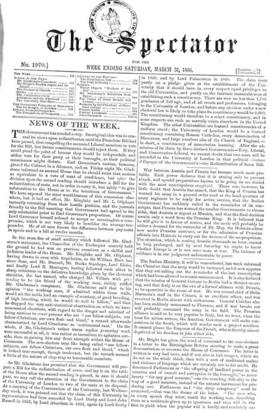In the cross-fire of small artillery which followed Mr. Glad-
stone's statement, the Chancellor of the Exchequer scarcely held the ground he had won on previous occasions as a skilful and judicious leader of the House. Mr. Kinglake and Mr. Oliphant, having drawn in even with trepidation, as Sir William Hutt has since done, and Mr. Disraeli, Mr. Banks Stanhope, Lord Elcho, and finally Lord R. Montague, having followed each other in sharp criticisms on the defective knowledge given by the electoral statistics, the last named, who charged Mr. Villiers with pre- tending to be the friend of the working man, visibly ruffled Mr. Gladstone's composure. Mr. Gladstone said that in his opinion " the working man, if admitted within these walls, would set the noble lord an example of courtesy, of good breeding, of high breeding, which he would do well to follow," and then he dropped the very anti-statistical observation on which we have commented elsewhere, with regard to the danger and mischief of being anxious to count persons who are "our fellow-subjects, our fellow-Christians, our own flesh and blood," a remark afterwards characterized by Lord Cranborne as 'sentimental rant.' On the whole, if Mr. Gladstone's rather warm replies yesterday week were successful at all, it was rather as incentives to agitation out- side, than as gaining him any fresh strength within the House of Commons. The non-electors may like being called "our fellow- subjects, our fellow-Christians, our own flesh and blood," which is indeed true enough, though irrelevant, but the remark seemed a little of the nature of clap-trap to honourable members.






























